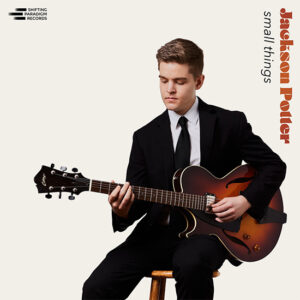
With small things, guitarist-composer Jackson Potter emergences as a thoughtful architect of the modern jazz narrative. The album, released on Shifting Paradigm Records, is an elegant synthesis of compositional clarity, ensemble chemistry, and rhythmic depth that speaks fluently to jazz fans. Rooted in tradition but attuned to contemporary sensibilities, the record highlights Potter’s facility on the guitar and his maturity as a writer and bandleader within New York’s intense creative climate.
The album opens with “Trams,” a composition by tenor saxophonist Troy Roberts that sets a mood for the ensemble interplay and dynamic flow. A rhythmic motif in the lower register ushers in the track, establishing a grounded pulse that gradually unfurls into the main theme, where the horns unify with compelling precision. The interlude before the solo section is a standout, Roberts and Alex Ridout solo together, building energy through layered phrasing and counterpoint. Potter’s solo that follows is steeped in the hardbop lineage, but informed by a modern sense of harmonic reach. He navigates the form with snaking bop lines and strong motifs, delivering a solo of athleticism and architecture. Roberts’ follow-up solo is commanding in tone, time feel, and control as he is so fluid and expressive, it’s a pleasure to witness a musician in such complete command of his voice.
The title track, “small things,” leans into a lush contemporary aesthetic, made texturally vivid by the presence of guest vocalist Sophia Formella and alto saxophonist Jaleel Shaw. Formella’s wordless melody lines blend seamlessly with the horns, adding a breath-like softness and shimmer to the ensemble sound. Her intonation and rhythmic delivery are spot-on, and the effect is both grounding and transportive. Potter’s solo is built patiently and with intention, rising in register and rhythmic density, his descending rakes adding expressive contour to the phrasing. A harmonic shift gently welcomes Shaw’s solo, which enters with poetic finesse builds with his rhythmic clarity and melodic arc deepening the emotional resonance of the piece.
“Mr. M” introduces a catchy jazz-funk hybrid feel. Ridout delivers the melody with radiant tone, while Roberts provides contrapuntal commentary. Potter’s comping is relaxed but full, enriching the harmonic environment while maintaining the rhythmic flow. Roberts’ solo bursts forth with commanding articulation and inventive phrasing, while Potter’s improvisation is marked by a conversational blend of single-line melodies and chordal passages. His ability to build thematic continuity while maintaining groove-oriented momentum is notable.
“Smoke Gets in Your Eyes” offers a compelling window into Potter’s solo guitar voice. His rubato introduction captures the tune’s nostalgic core while expanding it harmonically. The clarity of his time feel and voice-leading elevates the standard without losing its sentimentality. When the ensemble enters at the bridge, the energy expands, and Ridout delivers a flugelhorn solo of exceptional nuance as each phrase floats on the harmonic bed with expressive grace and tasteful embellishment. Potter’s accompaniment and solo work here are understated but rich with harmonic dialogue, subtly honoring the tradition while moving it forward.
The groove hits harder on “Hey, It’s Me You’re Talking To,” a Latin-tinged burner that pulses with ensemble energy. The drum and bass team of Marcello Cardillo and Hamish Smith ignite the rhythm section with drive and clarity. The horns play the head with pinpoint accuracy and vigor. The call-and-response section between trumpet and saxophone evolves from clipped exchanges into full-form improvisational dialogue. Both Ridout and Roberts exhibit a masterful grasp of rhythmic play and form manipulation, their solos building toward a powerful climax. Potter’s comping during this section is intuitive and responsive and never in the way, always guiding the groove. His own solo that follows sustains the momentum, expanding on the rhythmic and melodic energy while crafting a clear narrative arc.
“Background Noise” shifts the atmosphere into a more reflective space, blending straight-eighth groove with folk-jazz hues. The composition unfolds gradually, its strength lying in subtle ensemble interaction. Smith’s bass tone is rounded and percussive, syncing tightly with Cardillo’s textural drumming. This provides a deep pocket over which Potter and Roberts shape their solos. The interplay is conversational as each player contributes tone, rhythm, and phrasing that feel purposefully interwoven. Potter’s restraint here is admirable, using space and motivic development to speak rather than dazzle.
“The Duke” is a cool-jazz homage with arrangements that nod to the tonal palette of Gil Evans. The voicings in the head are harmonically rich and spacious. Ridout’s trumpet solo captures the aesthetic with lyrical simplicity, phrasing that lets the lines breathe. Potter’s accompaniment provides subtle harmonic direction, and when he steps forward as a soloist, he draws from the same tradition, his articulation accenting pedal points and inner voice movement. His solo reads like a study in textural economy and clarity.
“Everything I Love” begins with a tender solo guitar statement, a moment of introspection that showcases Potter’s mastery of layering melody, harmony, and bass movement. The track then shifts into an up-tempo swing, inspired by the buoyant eighth-note language of 1950s jazz guitarists. Potter channels that energy with stylistic ease, his solo marked by clean articulation, rhythmic lift, and idiomatic clarity. Roberts’ solo is a playful swinging expression of tone and time.
“Sophia’s Waltz” brings the album to a relaxed, elegant close. The Potter composition is a modern jazz waltz with a well-shaped melody voiced by Ridout on flugelhorn. Her delivery is warm and lyrical, her phrases floating over the harmony with relaxed precision. Smith’s bass solo is melodic, motivic, and perfectly in step with the tune’s mood. The rhythm section switches to a walking swing feel during Potter’s solo, his fluid command of meter and form shinning bright. The performance remains melodic and centered, closing the album with a sense of warmth and grace.
As a full statement, small things exemplifies Jackson Potter’s rising artistry. The record offers a balance of thoughtful writing, inspired playing, and deliberate pacing, making it a compelling listen. Potter’s voicings and rhythmic development is attuned to the ensemble’s energy and momentum. For jazz fans this album is a blueprint for how contemporary jazz can remain rooted in tradition while speaking in a distinctly modern voice.


